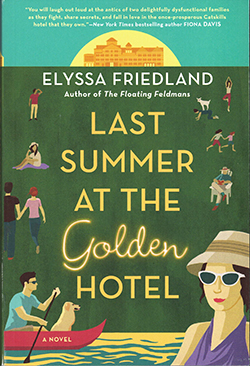Last Summer at the Golden Hotel by Elyssa Friedland; (c) 2021, Penguin Random House; ISBN 9780593-199725; 351 pages including acknowledgments and questions for discussion, $16.
By Donald H. Harrison

 SAN DIEGO — This is an American Jewish novel about two families coming to terms with the fact that the fictional resort that best friends Benny Goldman and Amos Weingold founded in the Catskill Mountains has long passed its prime. The Golden Hotel no longer is booked to capacity, nor even near capacity, and the once famous Borscht Belt resort has quite obvious wear and tear to show its decline.
SAN DIEGO — This is an American Jewish novel about two families coming to terms with the fact that the fictional resort that best friends Benny Goldman and Amos Weingold founded in the Catskill Mountains has long passed its prime. The Golden Hotel no longer is booked to capacity, nor even near capacity, and the once famous Borscht Belt resort has quite obvious wear and tear to show its decline.
Benny, now deceased, and Amos felt too aged to engage in active management, as did their wives, respectively Louise and Fanny. Initially none of the children in the second generation of their families was interested in keeping the hotel going. However, after Brian Weingold’s marriage ended with the sudden discovery of his wife in the passion of an extra-marital affair, a job as the hotel’s manager became his lifeline, though he had no real aptitude for the task. Still, he had grown up at the resort, so he was familiar with some requirements of the job–if only by osmosis. His business-minded brother, Peter, would have been a far better manager, but he was busy making a fortune as a merger and acquisitions expert in Manhattan. That came at the expense of spending time with his wife, Greta, and his two children.
As boys, Peter and Brian both had crushes on Benny and Louise’s only child, Aimee Goldman. The three of them had played together as youngsters and had mischievous adventures as teens. However, she eventually married a doctor, Roger Glasser, who we soon learn is suspected by the FBI of making money hand over fist by illegally prescribing unnecessary drugs.
Five grandchildren completed the roster of the two families. On the Goldman-Glasser side, they included Maddie, soon to be engaged to the son of a family that counted itself part of higher society; Scott, a medical student; and Zach, a computer nerd who still lived at home. On the Weingold side, the two grandchildren were Phoebe, who earned money as a glamorous influencer on social media; and Michael, a gay Harvard drama student who had yet to come out of the closet to his family.
What brings all of them together in one place is an offer from a holding company to purchase the hotel and expansive lakeside grounds for $12 million. That company had no intention of refurbishing the grand old resort; instead it planned to tear everything down–the hotel, the cottages, the theater, the several different activity buildings, and put in their stead a casino to compete with another gambling palace in the region. To sell the hotel meant to bring the Borsht Belt era to an end, and to stub out the legacy of Benny and Amos.
Nevertheless, there were compelling reasons to sell, chief among them the fact that the two families did not have sufficient capital to make all the improvements necessary to bring the resort into the modern age. Even if they did, could a grand resort in the Catskill Mountains ever attract the kinds of crowds it once did, when, before air conditioning, Jewish families felt it necessary to escape the summer heat of New York City by heading for the cooler hills? Wouldn’t it still be easier for families to fly to beach resorts in other parts of the world, where they could cool with ocean waves? Whereas overt antisemitism once prompted Jewish families to seek a hotel where their patronage and Yiddishkeit were valued, was such a refuge even needed among today’s highly assimilated Jewish families?
Waves of nostalgia, combined with some budding romances and third-generation enthusiasm for revamping the property, compete with old feelings of jealousy and the need for pragmatic decision-making as members of the two families ponder whether to accept the holding company’s offer that would result in this being the “last summer at the Golden Hotel.”
The novel is easy and enjoyable to read, boasting various points along the way that seemed to call for exclamation points. Such moments in television series often are presented as cliff-hangers necessitating viewers to tune in the following week to see how this or that new surprise will be navigated. In the novel, the suspense is not so nearly prolonged. All one has to do is keep turning the pages.
For light summer reading, Last Summer at the Golden Hotel hits the spot.
*
Donald H. Harrison is editor of San Diego Jewish World. He may be contacted via donald.harrison@sdjewishworld.com